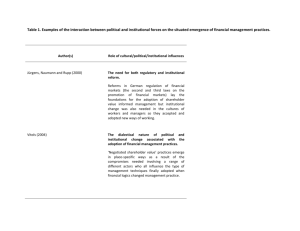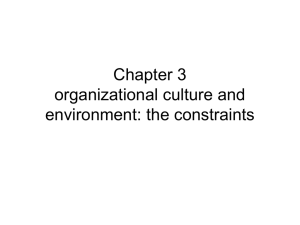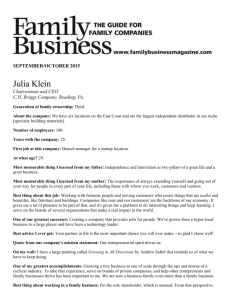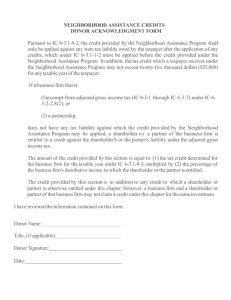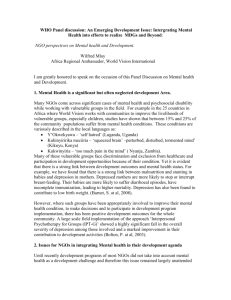La base del llamado activismo accionarial (sharholder advocacy
advertisement
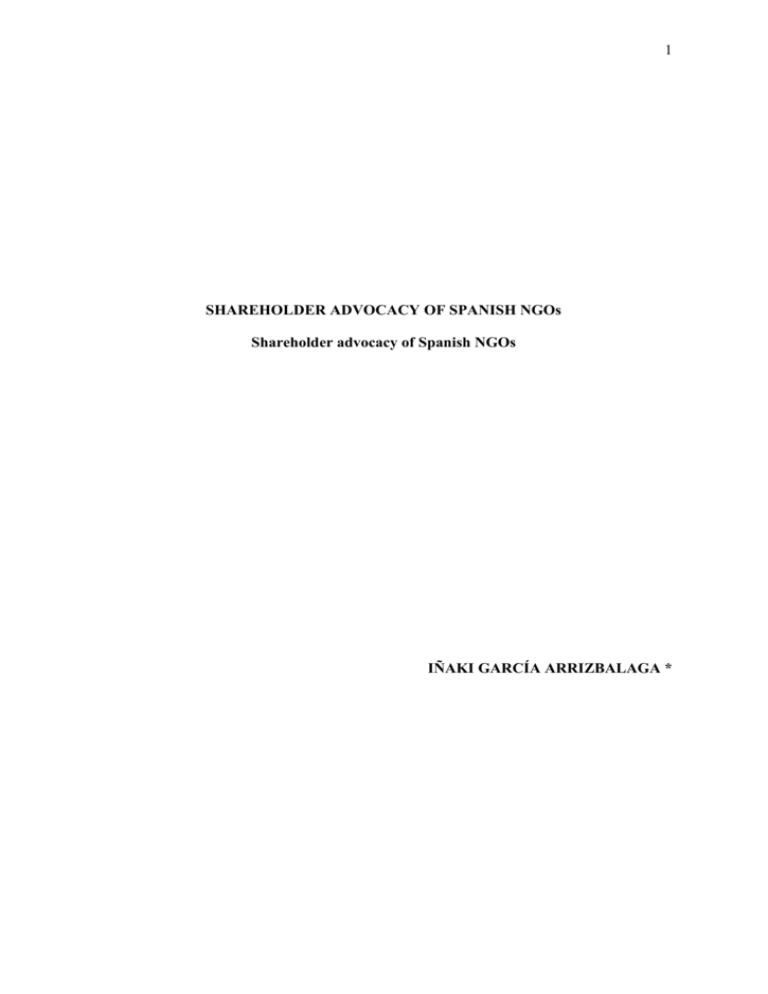
1 SHAREHOLDER ADVOCACY OF SPANISH NGOs Shareholder advocacy of Spanish NGOs IÑAKI GARCÍA ARRIZBALAGA * 2 * Iñaki García Arrizabalaga, Ph.D.; Associate Professor of Marketing at ESTE School of Management, University of Deusto; igarri@ud-ss.deusto.es Postal address: University of Deusto; Mundaiz, 50; 20012 SAN SEBASTIÁN; SPAIN 3 ABSTRACT Although little research attention has been devoted to the topic of non-governmental organizations’ (NGO) shareholder activism (or shareholder advocacy), it is becoming an increasing phenomena in some Western societies. Shareholder advocacy of Spanish NGOs is still very uncommon compared to other Anglo-Saxon countries. However, the success of the latest cases in Spain may show that this manner of claiming changes in corporate behaviour could become usual for companies with strong brand images, because they are most sensitive to being taken as symbols by NGOs. In spite of this trend, there are still very critical Spanish NGOs and they warn about the risk of big companies being the ones using NGOs to legitimize themselves. They are of the opinion that shareholder advocacy would lack the power to create significant corporate change. 4 NGOs AND SHAREHOLDER ADVOCACY NGOs can be defined as non-profit groups that combine resource mobilization, information provision, and activism to advocate for changes in socially irresponsible corporate behaviour. (Spar and La Mure, 2003). Although definitions of shareholder advocacy are quite different from each other, in general terms the concept could be defined as consisting of shareholders in a company exercising their rights with the aim of controlling, and even influencing, how environmental and social aspects in which the company has invested are managed. Similarly, shareholder activism would be “the process by which shareholders of a listed company, under the provisioning of securities legislation in various jurisdictions, can requisition its members to meet and vote on specific resolutions” (Haigh and Hazelton, 2004:60). The base of NGOs’ shareholder advocacy consists of an NGO acquiring the minimum block of shares allowing it to attend the annual shareholders board meeting in a company or having recourse to its right of attendance. In the board it makes use of the right of every shareholder to speak, in this case to demand more responsible social or environmental policies. To organizations in the civil society, shareholder advocacy is included within the so called impact activities: those which they carry out as stakeholders with the aim of achieving changes in policies and government programmes, in business behaviour or in habits and attitudes of society in specific situations. Impact is a strategic activity and is directly related to the mission and rationale of the major part of organizations in civil society (Marimon and Vidal, 2008). 5 In a broader context, NGOs’ shareholder advocacy can be understood as a form of political consumerism. Although the concept was originally introduced by Micheletti (2003) in order to label the political phenomena of consumers’ boycotts, it may also extends today to other individual or groups actions carried out for social or ethical reasons. NGO’s shareholder advocacy would be part of this “movement (which) is increasingly convincing consumers that sweatshops are social injustices and that certain actors have responsibility to solve sweatshops problems. In so doing, it challenges conventional views of political responsibility by going beyond government and calling on citizens and on corporations to play their part” (Micheletti and Stolle, 2007: 157158). To NGOs shareholder advocacy has become an effective strategy, because with these activities of pressure they manage to infiltrate into the core of the company and redirect its activities to report business policies they consider incompatible with Corporate Social Responsibility principles, and which are often unknown by great part of shareholders. Implicit in this process are three key turning points. First, the NGO must be able to threaten the firm with significant reputation harm. Second, the firm must respond to this threat bt changing its business practice. Finally, the change must serve to advance the NGO’s goals (Spar and La Mure, 2003) Growing perception amongst shareholders of the need of financially and extrafinancially reliable and verifiable information (Alonso, 2004) and the world trend in favour of Corporate Social Responsibility, which has become a first-class issue, is pressing companies to be sensitive to these concerns. Most consolidated companies, the ones with a strong brand image, the ones that intensely compete for consumer loyalty 6 and therefore in the need to watch their reputation more than anyone else, are also most sensitive to be taken as symbols by NGOs for the exercise of shareholder advocacy. To NGOs shareholder board meetings, because of their impact in the media, are a magnificent platform for this claim, because they give a great visibility to the issue and because the president of the transnational company would listen first-hand to criticism that rarely would get to him directly. Since the 1970's many organizations, particularly in the USA, have been working in this because it is considered an efficient strategy. The Interfaith Center on Corporate Responsibility (ICCR) is one of the precursors, a religious group investing in companies in order to attend and participate in meetings and exercise full voting rights. With an aggregate portfolio of more than 110,000 million dollars, it has managed to influence in shareholder board meetings of transnational Wal-Mart (Vilnitzky, 2006). At times pension funds are, as conjoiners of individual wills of small shareholders, the ones which put shareholder advocacy into practice by pressing the company to adopt specific measures in the wide sphere of sustainability. One of the most known cases of this “responsible shareholding” –term preferred to “socially responsible investing”, as Johnson and Brennan (2007) call this type of shareholder advocacy– may be that of CalPERS fund, which pressed the pharmaceutical company GlaxoSmithKline to recheck the medicines against AIDS sold by the company in developing countries. The company responded by reducing the price of those medicines by 74% for humanitarian programmes. SITUATION IN SPAIN 7 Shareholder advocacy is a policy born in Anglo-Saxon countries, where it is fairly widespread, specially in the United States (Alonso, 2004). In Spain, however, this practice is very uncommon (Gutiérrez, 2005). Still, everything shows it is going to become usual in big companies, as civil society and shareholders get organized (Rusiñol, 2008). An evidence of this is that during the XI annual meeting of the “Committee on Workers’ Capital”, arranged in Madrid in October 2007 by UGT and CCOO trade unions, one of the topics was how to carry out shareholder advocacy and vote delegation activities in shareholder board meetings in coordination with NGOs (CCOO, 2007). Gutiérrez (2005) notes as one more aspect in favour of shareholder advocacy in Spain the fact that entitlement over shares has grown far more than other forms of property. Massive possession of shares by conscious and critical citizens would open unprecedented possibilities of political influence, even further than pressure or claim strategies by NGOs. In the following lines we summarise three cases of shareholder activism carried out by Spanish NGOs. - The first known case, dated 2001. - The last known case, dated June 2008. - The case known as the one with the greatest impact on the media, dated May 2008. There is general consent in admitting that the merit of the very first example of shareholder advocacy in Spain is attributed to SETEM, the NGO that most has practised it (Rusiñol, 2008). In 2001 they acquired 120 shares –there are 630 million– of Inditex (first textile company in Spain and fourth worldwide, owner of brands as Zara or 8 Massimo Dutti). With an investment valued at the time at 1,200 euros, this NGO managed to speak during the shareholder board meeting of the company to demand more information and transparency about the company's social responsibility, its relocations in the third world and Eastern Europe and the access to labour force from informal economy in Spain and Portugal. Five years later the company set up a Corporate Social Responsibility department and announced it had entered the ETI (Ethical Trade Initiative), an independent organization with the objective of improving the code of conduct of production lines (Vilntzky, 2006). In its latest campaigns SETEM invites through the Internet to citizens to propose questions they want the NGO to ask in following shareholder board meetings at Inditex, using the block of shares it already owns. This example also illustrates what Alonso noted (2004), in the sense that the economic capacity of a NGO is not usually a limiting factor to shareholder advocacy, because the need of investment to exercise the right to speak in board meetings is ordinarily not too high. The latest –and curious– case known of shareholder advocacy in Spain was again carried out by the NGO SETEM, which with its campaign “Finanzas Éticas” (Ethical Finances) has put into practice several protest actions against the participation of Banco Santander Central Hispano (first bank in Spain) in the construction of four hydroelectric dams in Río Madera, in the Brazilian Amazon, with serious environmental and social consequences for native communities which economy depends on fishing. SETEM was working on the issue for more than one year but had achieved no answer from the bank. In an act celebrated in June 2008 in front of the Bolsa de Madrid (the Madrid stock market), it has organized an original draw of three blocks of one thousand real shares of the bank with the objective of attracting attention of citizens over the fact 9 that savers are unaware of the consequences of what banks fund with their money. SETEM has also taken part, with the same purpose, in the latest shareholder board meeting of the bank with the support of more than 30,000 shares. With this intervention they have achieved the commitment of the president of the financial entity, Emilio Botín, to study the case and inform in next year's board meeting about this process. The case of shareholder advocacy with the greatest known impact to date in Spanish media took place in May 2008. Several weeks before the NGO Intermón Oxfam had already questioned the presence of Repsol in the FTSE4Good Ibex index, the newly created ethical index of the Madrid stock market in April 2008. The NGO spoke in the shareholder board meeting of Repsol, with its president Antonio Brufau in the front line, to report that this transnational Spanish company –which last year had a record profit of 3,188 million euros– does not respect basic and internationally admitted rights to native communities in Latin America. This was the purpose of the intervention: to make an attempt to convince the company to approve a code of conduct respecting native communities in locations where oil wells are being worked, particularly in Peru (Intermón Oxfam, 2008). Intermón Oxfam bought no shares. The right to speak in the board meeting was handed over by close to 900,000 shares (0,06% of the social capital). About 81,000 came from Spanish investors and the rest from four North American investment funds: Boston Common Assets, Calvert Asset Management Co. (one of the largest social and environmental investment funds in the United States), Boston Common International Social Index Fund and Friends Fiduciary Corp. These four funds also sent a letter to Repsol YPF before the board meeting urging the company to get a policy of respect toward native communities in keeping with international rules as soon as possible. As 10 Intermón Oxfman notes: “Repsol had no choice but to listen because it was not only an NGO talking, we also had the strength of almost 900,000 shares” (Rusiñol, 2008). Has the denounce by Intermón Oxfam been any use or is it just work at cross purposes? From the department of Corporate Social Responsibility at Repsol the company notes that “we think it is great that Intermón Oxfam has taken part in the board meeting [...]. Collaboration is a need: companies and NGOs do not see each other as enemies any more” (Rusiñol, 2008). After the claim, Repsol undertook during the shareholder board meeting itself to debate a declaration of principles and rights of native communities with the NGO, which draft has been considered vague and imprecise by the NGO recently. LIMITATIONS AND CRITICISM TO NGOs’ SHAREHOLDER ADVOCACY IN SPAIN Shareholder advocacy in Spain seems to have entered a stage of growth according to the model of life cycle of social movements. With the growth, warnings and criticism have arrived as well. Some voices alert that the visibility and the apparent effectiveness of this actuation by NGOs can take them to pay less attention to other forms of pressure, because they can find themselves overwhelmed by this new type of social auditing (Rusiñol, 2008). The apparent effectiveness achieved in the Repsol case has also been called into question. The Observatorio de la Deuda en la Globalización (Observatory of Debt in Globalization), connected to the Universidad Politécnica de Cataluña, is still more pessimistic and reminds that its organization had already taken part in the board meeting 11 of Repsol YPF in 2006 and that Brufau took note of it at the time. “It was useless; it was not worth the paper it was written on” (Rusiñol, 2008). There currently exists a debate in the sphere of Spanish NGOs about whether it is good to buy shares of a company with unsustainable policies and which do not respect human rights, or whether it is worth it to make pressure from the inside of transnational companies. There are NGOs very critical to Corporate Social Responsibility programmes of Spanish transnational companies, because they make small donations and have a huge media capacity to make them profitable in terms of advertising, while they preserve community and territory destroying programmes. According to this opinion, which mentions the “Corporate Social Irresponsibility” of Spanish transnational companies (Rusiñol, 2008), the danger resides in big companies using NGOs to legitimize themselves. This analysis turns shareholder advocacy completely around: more than NGOs taking over shareholder boards, big companies would be taking over NGOs with the inducement of money for corporate social responsibility. This is consistent with Haigh and Hazelton’s (2004) point of view. They suggest that the current mecanisms of shareholder activism have been largely unsuccessful due to their ad hoc character to address social and environmental issues. Although in some countries shareholder activism campaigns have been dveloped by NGOs, in reality are only “isolated instances of success in achieving outcomes (which) mask the reality that systematic change to industrial practices or engagement with issues at an industry level has not been the focus of shareholder activists” (Haigh and Hazelton, 2004:50) . Thus, shareholder advocacy would lack the power to create significant corporate change, because it is “unlike to result in long-term desired social outcomes” (Haigh and Hazelton, 2004:67) . 12 FINAL THOUGHT Access to the stock market, social license to do business and reputational risk are becoming increasingly important for companies and they are, precisely, firm foundations for success of shareholder advocacy by NGOs as a way to claim changes in corporate behaviours. For NGOs, citizens as shareholders can become the countervailing power to corporate socially irresponsible behaviours. The greater value a firm places on its brand, the more susceptible the company will be to this kind of pressures. Southern Europe countries display the lowest levels of any form of political consumerism (Ferrer, 2004), concept in which we can include NGOs’ shareholder activism as a sign of the on-going empowerment of civil society organisations. For the Spanish case, civil society organizations dying of success or being “devoured by the system” with its practice are risks that are taken more as potential than real for the moment. Meanwhile, shareholder advocacy, widely understood as the right for social interference in company management, is introducing a breath of fresh air into the market, making the citizen-investor-shareholder get back its main character role in the company, to transform him into an active subject of the development and social responsibilities of consumption in modern life. Thus, NGOs’ shareholder activism, as part of the political consumerism ovement, would not focus only on improving corporate policy and practice, but on “changing the consumers’ worldview about the role of consumption in society as a whole” (Micheletti and Stolle, 2007:160). Certainly, measuring political activism is always tricky. Micheletti and Stolle (2007:171) maybe 13 touch a raw nerve when they state that “high visibility and recognition of sweatshop problems and even a mobilized consumer spirit up-and-ready for personal responsibility-taking do not automatically lead to corporate change” REFERENCES Alonso, Bettina (2004), “Vías de diálogo entre las empresas y sus grupos de interés”, Boletín CIES, Centro de Investigación de Economía y Sociedad, 20, http://www.grupcies.com/. CCOO (2007), “CCOO y UGT acogen la XI reunión sindical internacional de representantes de fondos de pensiones”, http://www.ccoo.es/. Ferrer, Mariona (2004), “Cross-national variation on political consumerism in Europe: exploring the impact of micro-level determinants and its political dimension”, Working paper presented for the ECPR Joint Sessions, Uppsala: Sweden. Wokshop 24, “Emerging repertoires of political action: toward a systematic study of postconventional forms of participation”, 1-26. Gutiérrez, Antoni (2005), “8 millones de accionistas, 8 millones de electores”, http://www.gutierrez-rubi.es/. Haigh, Matthew and James Hazelton (2004), “Financial Markets: A Tool for Social Responsibility?”, Journal of Business Ethics, 52(1), 59-71. Intermón Oxfam (2008), “Intervención de Intermón Oxfam en la Junta de Repsol del 14 de mayo 08”, http://www.intermonoxfam.org/es/. 14 Johnson, Victoria E. and Linda L. Brennan (2007), “Using infomediaries to build effective networks between business and society”, Corporate Governance, 7(3), 301-311. Marimon, Carla and Pau Vidal (2008), “La incidencia política: un reto para las entidades del tercer sector”, http://www.tercersector.org.es/. Micheletti, Michele (2003), Political Virtue and Shopping: individuals, shopping and collective action, New York, USA: Palgrave Macmillan. Micheletti, Michele and Dietlind Stolle (2007), “Mobilizing Consumers to Take Responsibility for Global Social Justice”, The Annals of the American Academy of Political and Social Science, 611(1), 157-175. Rusiñol, Pere (2008), “Activismo en los púlpitos del poder económico”, El País, May 17, http://www.elpais.com/. Spar, Debora L. and Lane T. La Mure (2003), “The Power of Activism: Assessing the Impact of NGOs on Global Business”, California Management Review, 45(3), 78101. Vilnitzky, Mariana (2006), “ONG en la junta de accionistas”, El País, February 19, http://www.elpais.com/.
